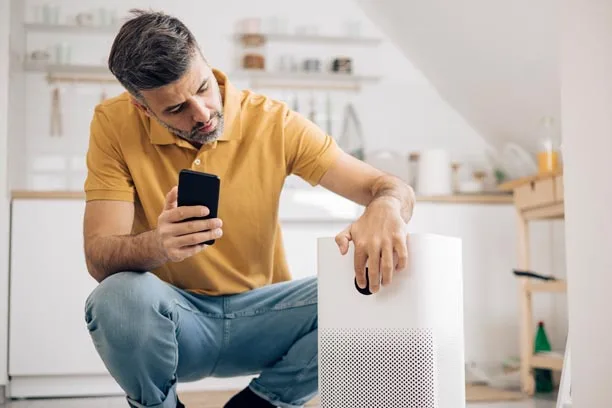10 Ways to Get Cleaner Air at Home


With weather apps pushing the outdoor air quality index to your phone, you probably know when breathing the air outside is less healthy. But the air quality inside your home matters too, and it can impact your whole family.
These tips to purify the air in your home can help everyone in your household breathe easier.
Pulling contaminants out of the air with an air purifier is one of the best things you can do to keep indoor air clean. Plus, if something happens to send a lot of impurities into the air — say, you burn something when you’re cooking — you can speed up the purifier and quickly clear the air.
Be sure to read the instructions on cleaning products, drain cleaners, pesticides, rust removers, chrome polishers and other household chemicals. Many of these products contain harmful substances you can breathe in when you use them.
Store these products in cool, dry places out of reach of children. Keep them in their original packaging so you can read the directions and warnings.
And don’t mix cleaning products — that could create dangerous, combustible fumes or cause a chemical reaction that makes the container leak.
When the air quality outdoors is good and the temperature is right, open your doors and windows. Natural ventilation can reduce indoor pollutants and improve your air quality.
Getting houseplants is a great way to clean the air in your home naturally. Several types of low-maintenance houseplants can filter out common toxins from your indoor air. Spider plants, for example, can remove airborne toxins like formaldehyde and carbon monoxide.
Even when you don’t need to cool your home with air conditioning, keep the fan running. The filter on your central air system can help remove dust, pet dander and pollen from the air. Just remember to change the filter on schedule so you’re getting the maximum benefit from your system.
In the bathroom, running the fan can keep warm, moist air from settling on your walls and ceilings. That’s important because mold can start to grow in as little as 24 hours. In the kitchen, cooking fat, oil and spices can lead to unhealthy air, so it’s crucial to run the exhaust fan.
You may have damp air in parts of your home other than bathrooms, like basements, where there’s not an exhaust fan to help clear it. In those areas, a dehumidifier can help pull moisture out of the air before it can settle on surfaces and become a breeding ground for mold and mildew.
You want to hit the sweet spot with moisture in the air — not too much and not too little. In the winter, you may want to use a humidifier. Humidifiers don’t remove air pollution, but they can make it easier to breathe and help keep your nasal passages moist so your body can fight viruses and bacteria.
Household air ducts need to be cleaned regularly, since dust, pollen and pet dander can build up in them and recirculate throughout your house when your system is running.
You’ll also want to inspect your ductwork and repair it if you find any issues. Air duct leaks can create negative air pressure, which can pull outdoor air into your home through small cracks near doors and windows. If outdoor air quality is bad, contaminants like car exhaust and pesticides can get sucked into your home.
Dust is one of the top causes of indoor air pollution. Dust surfaces with a damp cloth so you collect dust instead of spreading it into the air. Vacuum carpets to get rid of the dust and pollen that settles there, so you don’t send it airborne when you walk around. It’s a good idea to vacuum furniture regularly, too.
Indoor air pollution isn’t the only hazard you and your family might face at home. Make sure your property and possessions are protected. A Farm Bureau insurance agent can recommend insurance for your home, apartment, condo or mobile home that gives you the coverage you need. Reach out today to learn more.